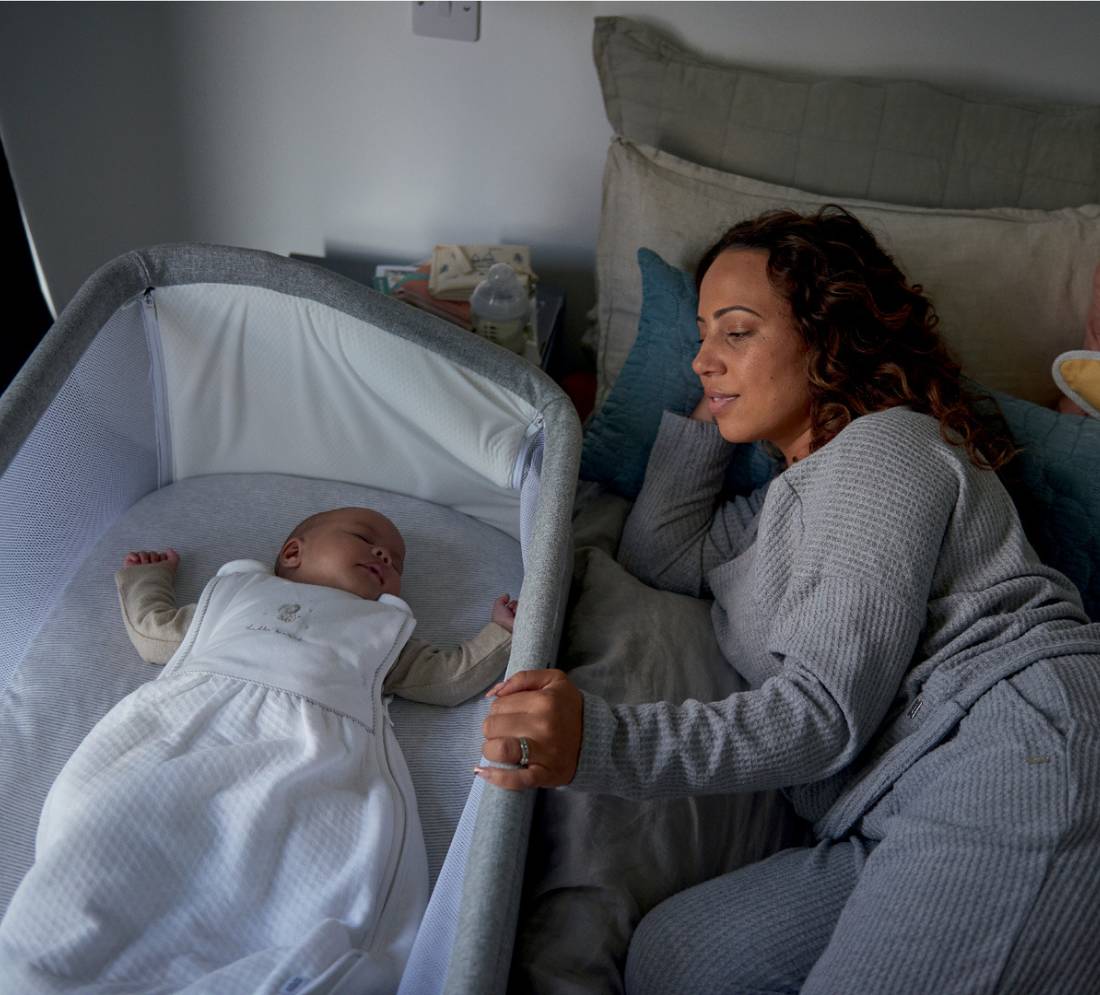
What factors does your baby’s sleep depend on?
Just like in adults, your baby’s sleep is dependent on their temperament, environment and bedtime routine. A cosy room with optimal temperature of 20-22°C and darkness will set the mood and relaxing wind down activities like a warm bath, lullabies and cuddles will prepare them for bed. Whether your little one has an energetic personality that needs a while to calm down or a sensitive one that wakes up at the slightest sensory stimuli, also impacts their sleeping patterns. Additional factors include their age and weight. While an infant may wake up multiple times throughout the night for feedings, they will sleep for longer periods as they learn to self-soothe.

Baby sleep patterns from birth to six months
0-3 months
During their first few months, babies are still adjusting to the world outside of their mother’s womb. Sometimes, this means they miss their old home and wish to go back, get confused between days and nights and have a heightened moro reflex (startle reflex) that can be triggered by loud noises, sudden moments or the baby’s own cry.
In these months, they will need to eat every 2-3 hours as their stomachs are tiny. And they will make their need known to you loud and clear with their cries even in the middle of the night. In case, your little one is not waking up at night, you’ll need to wake them up for feedings especially if they haven’t gotten back to their birth weight yet.
If you are nursing your baby, chances are your night feeding frequency will be higher to the ones having formula. This is because breast milk moves faster through the baby’s digestive system, and they will get hungry more often. So, sleeping through the night during the first 3 months is not so likely but things get better with time.

3-6 months
At 3 months, you’ll notice that your little one starts sleeping through longer hours. This is because they need fewer nighttime feedings, have a decreased startle reflex and are slowly but surely learning how to self-soothe.
As your little one grows, their feeding frequency will start decreasing from 2-3 hours to every 3-4 hours. And, by 6 months they’ll likely be eating every 4-5 hours which means they will sleep for longer hours and so can you. During this period, they also start having more control over their movements and reflexes. This means small movements, sounds and changes in their surroundings will not startle them awake. Finally, your little one will start learning self-soothing practices so they can put themselves to sleep even if they wake up at night.
By encouraging healthy sleep routines like putting them down for a nap in a dark room in their crib will help them distinguish between day and night. While putting them down to sleep when they’re drowsy will teach them to sleep by themselves.
| Age | Total sleep in 24 hours | Total sleep for daytime naps | Total sleep time at night |
|---|---|---|---|
| Newborns | 16 hours | 8 | 8-9 (with feedings throughout) |
| 1-2 months | 15.5 hours | 7 | 8-9 (with feedings throughout) |
| 3 months | 15 hours | 4-5 | 9-10 |
| 4-5 months | 14 hours | 4-5 | 8-9 |

When to visit the doctor
In most cases, babies will slowly get into a healthy sleeping schedule by 6 months with occasional night wakings during growth spurts and milestones. When your little one is teething, learning how to roll over, sit up or crawl, they might wake up at night. Other factors such as jet lag and sickness will also keep them awake. But if you notice other concerning signs such as snoring while sleeping, difficulty in breathing or fussiness during bedtime, visit your paediatrician.

How to cope with sleepless nights?
Now that you have learned your baby’s sleep patterns and when to take them to a doctor, find out how you can stay on top of your sleep and well-being so you can take care of yourself and your little nubbin in the long run.
-
Sleep when your baby sleeps: After the baby’s arrival, your house might start to look messy with laundry and dishes piling up plus endless to-do lists that just keep getting longer. In today’s hustle culture, you might be feeling guilty for not getting things done and sleeping would be the last thing on your mind. Plus, social media posts about parenting and beautifully curated parent and child photos can shame you into thinking that you are doing enough. But it is important to remember that taking a break and prioritising your health and well-being is equally productive.
-
Get support when needed: As a new mum or dad who has just welcomed a new member into their family, juggling everything can get overwhelming. Especially after long days of work when all you want to do is just sleep. To cope, ask your partner to take on the night duty. If they are equally as tired or busy, ask your relatives or friends to come stay over for a few days so that you can rest and rejuvenate.
-
Exercise and mental health: Due to the busy and often unpredictable nature of life during the first few months of baby’s arrival, you and your partner might have put your own physical and mental wellbeing on pause. We are talking about fitness classes being missed, morning meditations postponed and massage appointments being cancelled. With a restless mind and overly tired body, your sleep will be compromised. To prevent this, schedule some at-home exercises, walks around the neighbourhood or a weekly massage appointment to get yourself aligned. Prioritising self-care will help improve your sleep quality in the long run.









